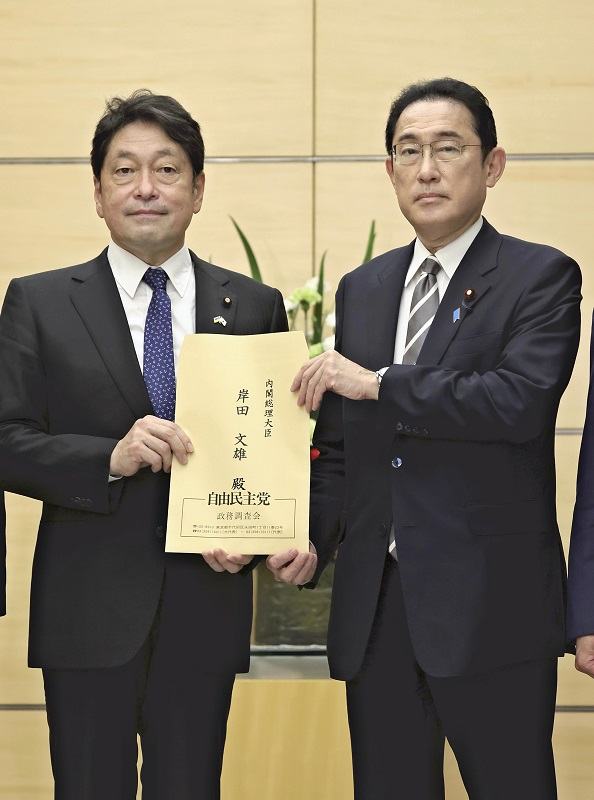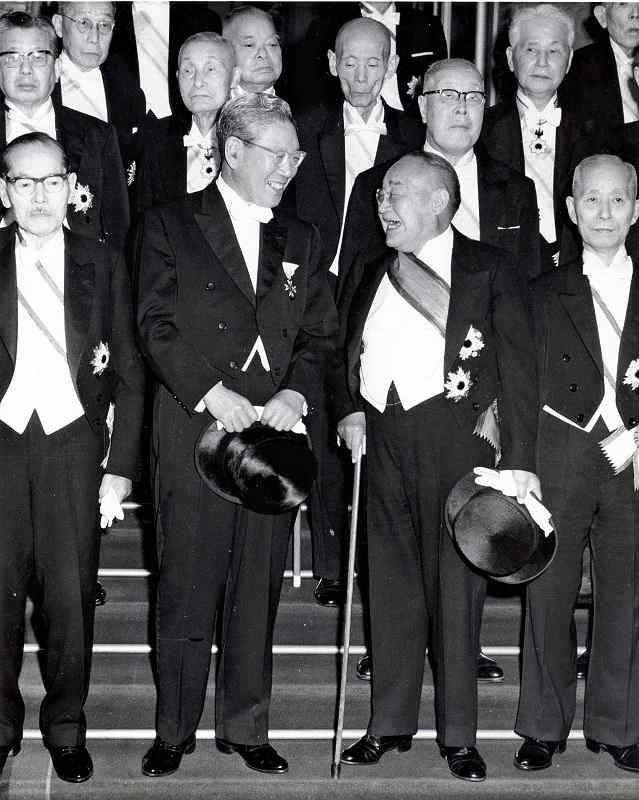Kishida’s first-year report card / PM determined to secure counterstrike capabilities

Prime Minister Fumio Kishida, right, receives proposals on national security from Itsunori Onodera, chairman of the Liberal Democratic Party’s Research Commission on Security, in May.
6:00 JST, October 9, 2022
Prime Minister Fumio Kishida’s Cabinet has passed the first anniversary of its inauguration with its approval rating on the decline. This series examines how Kishida’s political style so far has affected the handling of key issues and what the future holds for his administration.
***
Prime Minister Fumio Kishida is determined that Japan gain counterstrike capabilities to destroy enemy missile launch sites for self-defense purposes.
On April 27, Itsunori Onodera, chairman of the Liberal Democratic Party’s Research Commission on Security, met with Kishida in a conference room at the Prime Minister’s Office. Onodera, having twice served as defense minister, is the most knowledgeable defense expert in the Kochikai faction, which is headed by Kishida. The purpose of Onodera’s visit was to hand over a proposal from the commission that focuses on the possession of counterstrike capabilities.
“This is something that is absolutely necessary, so I want to do it,” Kishida was quoted as telling Onodera. “I’ll convey Japan’s stance to the United States as well.”
The way Kishida talked was calm, but Onodera sensed his strong resolve to obtain counterstrike capabilities.
Counterstrike capabilities are also called “capabilities for attacking enemy bases.” Past administrations have taken the position that such capacities are within the scope of the right of self-defense, but that “it’s a policy decision not to possess them.” The administrations feared that approving weaponry to attack the territory of enemy countries, even for the purpose of self-defense, would result in a public backlash.
If the Kishida Cabinet writes the policy of possessing counterstrike capabilities into three defense documents, including the National Security Strategy, set to be revised by yearend, it will mark a historic shift in Japan’s defense policy.
Even before becoming prime minister, Kishida had been positive about discussing a plan for the possession of such capabilities.
In April last year, Kishida made discussions on “capabilities to attack enemy bases” a pillar of his proposals for the field of diplomacy and national security, which were publicly released ahead of the LDP presidential election. This stirred controversy within his faction, with some saying Kishida’s proposals went “too far.” However, Kishida paid no heed to such claims, saying, “We need a system with which we can protect our country on our own.”
At the time, many within the party believed that Kishida’s move was likely aimed at drumming up support from former Prime Minister Shinzo Abe, as the Kochikai faction has traditionally been regarded as dovish.
Yoshida doctrine

Former Liberal Party President Shigeru Yoshida, right, smiles after receiving the Grand Cordon of the Supreme Order of the Chrysanthemum on May 6, 1964. At left is then Prime Minister Hayato Ikeda.
Former Prime Minister Hayato Ikeda, who founded the Kochikai faction in 1957, inherited the Yoshida doctrine, a national strategy that aims for a lightly armed nation and places importance on the economy, and that was touted by former Prime Minister Shigeru Yoshida. Kishida, for his part, regards Yoshida as a mentor. It’s this background that has led to the faction being regarded as dovish.
The Yoshida doctrine was premised on the idea that Japan should rely on the United States for its defense under the Japan-U.S. Security Treaty and that economic reconstruction should be prioritized over defense spending in the allocation of national resources.
Kishida, the ninth chairman of the Kochikai faction, has bluntly expressed discomfort about the faction being seen as dovish. Kishida at one point told those around him: “It doesn’t matter whether we are Kochikai or not. If counterstrike capabilities are necessary to ensure Japan’s security, we need to have them.”
Kishida sees the Yoshida doctrine as a form of realism.
During the Cold War, the reality was that Japan could not regain its national strength without relying on U.S. military power. Today, the reality is that the U.S. alone cannot counter China, so Japan also needs to enhance its deterrence capabilities. This frame provides the basis for Kishida to describe his own diplomatic line as “realism diplomacy for a new era.”
Legacy
The period in which Kishida served as foreign minister for the Abe Cabinet from December 2012 to August 2017 coincided with attempts by China to change the status quo in the East and South China Seas with its military might. North Korea was also steadily improving its nuclear and missile technologies. Kishida’s experience of supporting Abe’s diplomacy in this severe security environment in East Asia made his diplomacy what it is today.
Abe, who was fatally shot in July, issued in September 2020, just before his resignation, a statement that said he would present a policy on capabilities to attack enemy bases by the end of that year. Abe then passed the baton to his successor, Yoshihide Suga. However, Suga shelved discussions on the matter in consideration of public opinion and the LDP’s coalition partner Komeito.
Within the Kishida faction, members riding high expectations say that “If Kishida realized the possession of counterstrike capabilities, which even the Abe administration failed to achieve, and thereby ensured Japan’s security, that would be the political legacy of the Kishida administration.”
Toward the end of the year, the ruling LDP and Komeito will kick off talks on the issue, but Komeito leader Natsuo Yamaguchi, who is now in his eighth term, remains cautious when it comes to Japan obtaining counterstrike capabilities. And securing financial resources to increase the defense budget will not be easy either. There are many hurdles to clear before Kishida can establish his legacy.

What appears to be a possible new intercontinental ballistic missile is shown at a military parade in Pyongyang in October 2020.
Pursuing nuclear-free world
While Kishida is pursuing a foreign and defense policy based on realism, he is also pursuing an idealistic diplomacy with an eye toward the future.
As a member of the House of Representatives elected from the city of Hiroshima, which was devastated by an atomic bomb the U.S. dropped in 1945, Kishida has made nuclear disarmament his life’s work.
In August, Kishida became the first Japanese prime minister to attend a review conference of the parties to the Treaty on the Non-Proliferation of Nuclear Weapons in New York. He called for an action plan to achieve a “world without nuclear weapons.” In May next year, Japan will host a Group of Seven summit in Hiroshima at which he is expected to stress the importance of a nuclear-free world.
However, Japan also faces the reality that it must rely on the U.S. nuclear umbrella for nuclear deterrence. Given this restraint, Japan declined to join the Treaty on the Prohibition of Nuclear Weapons or participate as an observer in a conference of its signatory countries.
Top Articles in Politics
-

Japan PM Takaichi’s Cabinet Resigns en Masse
-

Sanae Takaichi Elected Prime Minister of Japan; Keeps All Cabinet Appointees from Previous Term
-

Japan’s Govt to Submit Road Map for Growth Strategy in March, PM Takaichi to Announce in Upcoming Policy Speech
-

LDP Wins Historic Landslide Victory
-

LDP Wins Landslide Victory, Secures Single-party Majority; Ruling Coalition with JIP Poised to Secure Over 300 seats (UPDATE 1)
JN ACCESS RANKING
-

Japan PM Takaichi’s Cabinet Resigns en Masse
-

Japan Institute to Use Domestic Commercial Optical Lattice Clock to Set Japan Standard Time
-

Israeli Ambassador to Japan Speaks about Japan’s Role in the Reconstruction of Gaza
-

Man Infected with Measles Reportedly Dined at Restaurant in Tokyo Station
-

Videos Plagiarized, Reposted with False Subtitles Claiming ‘Ryukyu Belongs to China’; Anti-China False Information Also Posted in Japan























